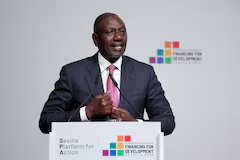The United Nations Human Rights Council (UNHRC) has rejected Eritrea’s bid to end the mandate of a UN expert investigating alleged human rights abuses in the country.
The motion was decisively defeated with 4 votes in favor, 25 against, and 18 abstentions. A counter-motion by the European Union to extend the mandate for a year was subsequently passed comfortably.
The UN expert, Sudanese rights lawyer Mohamed Abdelsalam Babiker, has been documenting human rights abuses in Eritrea since 2012.
In his last report, Babiker described the situation in Eritrea as critical, highlighting cases of arbitrary detention, torture, and extensive use of military service, which he said was stoking migration.
The extension of the mandate was welcomed by African rights group DefendDefenders, which said the UN expert plays an indispensable role in documenting abuses in Eritrea.
“The continued extension of the Special Rapporteur’s mandate is crucial for holding the Eritrean government accountable for its human rights record,” the group said.
Eritrea’s chargé d’affaires, Habtom Zerai Ghirmai, accused the EU of acting out of a “neo-colonial saviour mentality complex.” He argued that the continued extension of the Special Rapporteur’s mandate was an affront to reason and justice.
However, the EU and other supporters of the mandate argued that it was essential to ensure accountability and promote human rights in Eritrea.
The rejection of Eritrea’s bid to end the probe is seen as a significant victory for human rights advocates, who have been pushing for greater accountability and transparency in the country.
The UNHRC’s decision sends a strong message that human rights abuses will not be tolerated and that those responsible will be held accountable.









